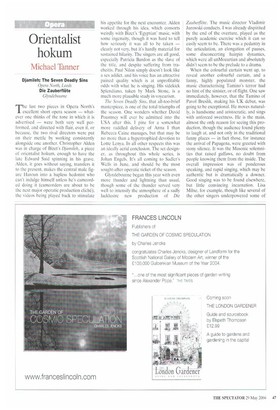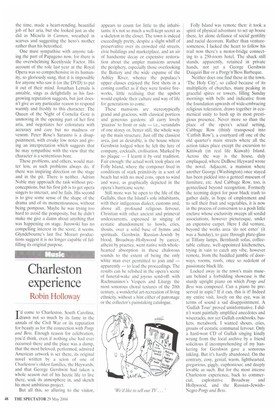Orientalist hokum
Michael Tanner
Djamileh; The Seven Deadly Sins Opera North, Leeds Die Zauberflote Glyndeboume
The last two pieces in Opera North's excellent short opera season — whatever one thinks of the tone in which it is advertised — were both very well performed, and directed with flair, even if, or because, the two rival directors were put on their mettle by working consistently alongside one another. Christopher Alden was in charge of Bizet's Djamileh, a piece of orientalist hokum, enough to have the late Edward Said spinning in his grave. Alden, it goes without saying, transfers it to the present, makes the central male figure Haroun into a hapless hedonist who can't indulge himself unless he's camcorded doing it (camcorders are about to be the next major operatic production cliché), the videos being played back to stimulate
his appetite for the next encounter. Alden worked through his idea, which consorts weirdly with Bizet's 'Egyptian' music, with some ingenuity, though it was hard to tell how seriously it was all to be taken — clearly not very, but it's hardly material for sustained hilarity. The singers are all good, especially Patricia Bardon as the slave of the title, and despite suffering from tracheitis, Paul Nilon simply doesn't look like a sex addict, and his voice has an attractive pained quality which is at unprofitable odds with what he is singing. His sidekick Splendiano, taken by Mark Stone, is a much more plausible study in voyeurism.
The Seven Deadly Sins, that all-too-brief masterpiece, is one of the total triumphs of the season. One wonders whether David Pountney will ever be admitted into the USA after this, I pine for a somewhat more raddled delivery of Anna I than Rebecca Caine manages, but that may be no more than a hypertrophied devotion to Lotte Lenya, In all other respects this was an ideally acrid conclusion, The set designer, as throughout this whole series, is Johan Engels. It's all coming to Sadler's Wells in June, and should be the most sought-after operatic ticket of the season.
Glyndebourne began this year with even more thunder and lightning than usual, though some of the thunder served very well to intensify the atmosphere of a sadly lacklustre new production of Die Zauberfldte. The music director Vladimir Jurowski conducts. I was already dispirited by the end of the overture, played as the purely academic exercise which it can so easily seem to be. There was a pedantry in the articulation, an elongation of pauses, some disconcerting hairpin dynamics, which were all unMozartian and absolutely didn't seem to be the prelude to a drama.
When the colourful curtain went up, to reveal another colourful curtain, and a funny, highly populated monster, the music characterising Tamino's terror had no hint of the sinister, or of flight. One saw immediately, however, that the Tamino of Pavol Breslik, making his UK debut, was going to be exceptional. He moves naturally, is handsome and aristocratic, and sings with unforced sweetness. He is the main, almost the only reason for seeing this production, though the audience found plenty to laugh at, and not only in the traditional funny places — in fact those, for instance the arrival of Papagena, were greeted with stony silence. It was the Masonic solemnities that raised guffaws, no doubt from people knowing them from the inside. The overall impression was of ponderous speaking, and rapid singing, which may be authentic but is dramatically a downer. Good singing was to be found elsewhere, but little convincing incarnation. Lisa Milne, for example, though like several of the other singers underpowered some of the time, made a heart-rending, beautiful job of her aria, but she looked just as she did as Micaela in Carmen, wreathed in scarves and suggesting the hero's mother rather than his betrothed.
One must sympathise with anyone taking the part of Papageno now, for there is the overwhelming Keenlyside Factor. His account of the role last year at the Royal Opera was so comprehensive in its humanity, so gloriously sung, that it is impossible for anyone who saw it (or the DVD) to put it out of their mind. Jonathan Lemalu is amiable, sings as delightfully as his fastgrowing reputation suggests, but just doesn't give us any particular reason to respond warmly and freshly to this character. The Queen of the Night of Cornelia Gotz is unmoving in the opening part of her first aria, and negotiates her coloratura with accuracy and care but no madness or venom. Peter Rose's Sarastro is a disappointment, with croaky low notes and giving an interpretation which suggests that he may sympathise with the view that the character is a sententious bore.
These problems, and others, would matter less, as such problems always do, if there was inspiring direction on the stage and in the pit. There is neither. Adrian Noble may approach the task without preconceptions, but his first job is to get opera singers to interact, and he fails. His second is to give some sense of the shape of the drama and of its momentousness, without being pompous. Maybe he was trying too hard to avoid the pomposity, but he didn't make me give a damn about anything that was happening on stage. Jurowski has no compelling interest in the score, it seems. Glyndebourne's last five Mozart productions suggest it is no longer capable of fulfilling its original purpose.



































































 Previous page
Previous page